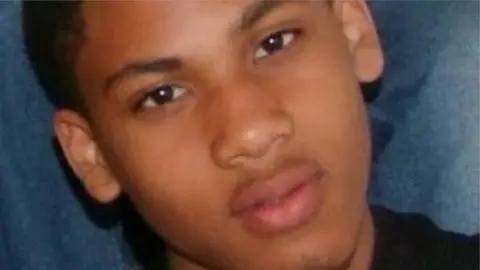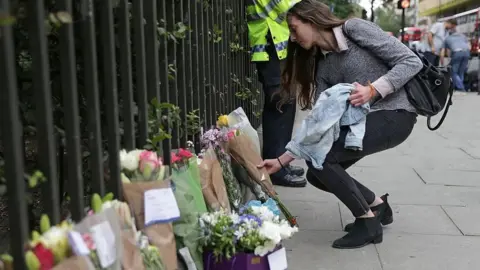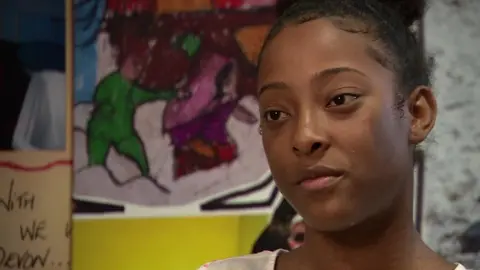Injuries increase as teens 'accepting' of knife culture
 Met Police
Met PoliceAn increasing number of teenagers in London are being injured by knives, figures obtained by the BBC show.
But why are teens continuing to carry knives - and what's it like growing up in this environment?
Twelve-year-old Imani Bennett is well aware of the danger of knives.
Her mother created a poster of pictures of teenagers who have been stabbed to death in London in recent years.
Sadly, she knew one of the boys on it.
Imani said the poster was not intended to upset her, rather her mother wanted her to understand what was happening and to plant a seed in her head that she was not to become another victim.
Imani's friend Shaquan Sammy-Plummer was killed in April 2016 as he attempted to leave a house party in Winchmore Hill. His murderer, Jemal Williams, wanted to teach the 17-year-old a lesson because he had refused to hand over a bag of drinks.
She often visits Shaquan's mother, who she describes as "like an auntie", and the pair sit in his room and talk about what happened.
"I connect to her a lot and I feel her pain and agony," she said.
 Getty Images
Getty ImagesShaquan's murder highlights some of the seemingly petty reasons why teens are being attacked in the city.
A stolen tracksuit, phone or bike, an insult on social media or in the street are some of the excuses given for murders in recent years.
In 2012, six teenagers were stabbed to death, five years later that figure has doubled.
The number of knife-inflicted injuries on the under 20s has also followed this upward trend - there were 957 victims in 2012, while in 2016 that figure increased by nearly 30% to 1,234.
The age which saw the biggest increase in injuries was 18, which rose by 44%.
Although knife crime is a national problem, London recorded the highest increase in knife attacks in the last financial year, according to the Office of National Statistics.
'Streets aren't safe'
Quamari Serunkuma-Barnes, 15, was murdered in Willesden, west London, in January. His murderer, who cannot be named due to his age, told his trial he was angry he had been insulted when a so-called rival gang member called him a derogatory name on social media.
Despite there being no evidence that Quamari was a member of a gang, the 15-year-old wanted revenge and attacked him as he left school.
Attacks like this not only affect the victim's loved ones, but also make other teenagers fearful and feel the need to protect themselves.
 Metropolitan Police
Metropolitan PoliceJoshua, Quamari's close friend, said he noticed a few of his friends began carrying knives after Quamari died.
He asked one of them why he felt the need to do so and the response was: "The streets aren't safe, anything can happen."
Tekisha, 15, from Catford, south-east London, said when she was in year eight at school she saw a friend get stabbed in the leg for going to another school and trying to fight a rival gang.
She says it has affected her upbringing as she does not feel comfortable going out at certain times and cannot visit some areas without a sense of fear.
"If I went to Peckham, I would fear for my safety. Not too much that I wouldn't go, but I would be apprehensive because if something potentially happened - would they recognise that I'm not from the area?"
Despite this awareness of knife crime, some teenagers have learned to avoid situations that put them at risk.
Fourteen-year-old Shannon Green-Barett from Hackney prefers to be mindful that people may be carrying a knife.
"I'm not scared to go out and be around people who may be in gangs because there won't ever be a situation where they have to take it out [on her]," she said.
She believes that despite the ubiquity of gang members in her area, she does not think they would harm people in their community.
"If you're going to go somewhere, you need to understand what might happen, the risks. If you're going into an estate, you're going to think that there will be gang members with knives whereas if you were to go down the road with a lot of houses you're not going to think that. It just depends on where you are.
"I've seen people use knives for protection, to feel safe and to know that if something really bad happens, they've always got that one weapon that could have a chance of saving their life. Or they want to prove that they're the one that 'if you mess with me, just know that I have a knife'.
"If you're friends with the person and they have a knife you don't really care because maybe nothing can break that friendship."

Imani says she avoids getting into arguments, particularly with groups including older girls, and tries to make friends with everyone on her estate.
"I know my boundaries, and they're older than me, so I can't disrespect them in a way where it will get to that point where they will take out a knife," she said.
She also has friends whose older brothers are in gangs and probably carry knives.
"As negative and horrible as this stuff is, what I try to do is, I try to understand it and I am not going to be like this, I'm going to try do my best to bring my community together."
'Fear perpetuates knives'
Janita, a youth manager for Hackney Quest, a community-based support group for young people, says it is upsetting that children as young as 12 think it is normal to be around knives.
"It's just really, really sad that they have almost become immune to it and they've had to learn to keep themselves safe in terms of staying away from certain areas or getting themselves involved with positive youth clubs and youth activities just so that they know that they've got communities around them."
What previously would have resulted in a fist fight now ends in a knife being pulled out, she explained.
 PA
PAJanita says because a lot of work is being done to try to overcome this issue, children therefore know about it and that perpetuates a fear.
"It's a vicious circle - the fear perpetuates the reactivity that perpetuates the knives. Their fear is often what will lead them into an attack."
But Areeb, 23, from Willesden, says it is important teenagers know what is going on.
In his area, three teenagers have been murdered in recent years.
"Gang members are the ones telling all their members to stay indoors. I feel the innocent ones have to be clued on to it more nowadays because anyone can get hurt."
But gangs account for less than 5% of London knife crime, according to a police and crime report.
Yvonne Lawson, whose son Godwin was stabbed to death in 2010, says: "It seems like you switch on the television and there's another knife crime.
"It's like it's accepted, we're normalising it. We can't normalise a precious life being taken away. We can't be complacent."
